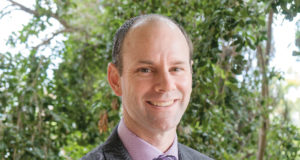Introducing “Mind the Gap”, a column by Trinity College Queensland lecturer Simon Gomersall exploring issues around young adults, church and managing transitions from one generation to the next.
Two women stood on the bow of a ship on a crisp, clear moonlight night. One surveyed the brilliance of the moon and stars reflected on the still water and, in a low voice, uttered, “It’s easy to believe in God on a night like this.” The other replied, “Yes, a God who is as cold as that ocean and as far away as those stars.”
Two people can look at the same thing and see it in completely different ways.
This is true of church, viewed by different generations. Older generations tend to cherish symbols and actions that preserve essential values and ideas. We call these traditions. Younger generations, educated in the ferment of post-modern assumption, have been taught from a young age to question everything, be suspicious of anything done out of habit, and deconstruct every ritual to provide clear access to the reality behind it, if, in fact, there is one.
You can see the potential for disconnection. Younger generations struggle to understand why the church keeps doing the same things, saying the same words, singing the same songs. Especially when those actions, words and songs appear so out of step with the rest of their lives. Older generations, sensing young people’s reluctance to value what has shaped their own faith, cling more tightly to their traditions and rituals, rightly concerned about what might be lost if they are changed.
The church of Jesus Christ must be, paradoxically, constantly changing and never changing. Some aspects of the church’s life must never change: the faith once for all entrusted to the saints. But the way we embrace, embody and communicate that faith must be constantly changing, allowing every new generation to hear “about God’s deeds of power, in their own language” (Acts 2:11).
The Basis of Union (Paragraph 11) similarly encourages, “… in obedience to God’s living Word … we might confess the Lord in fresh words and deeds.” Unfortunately, we sometimes change the things we shouldn’t and refuse to change the things we must.
So, to younger generations we implore: try to see “through” the rituals of your church’s worship to understand the reality behind it. At the heart of every preserved ritual is an insight or value central to our life in Christ.
To older generations there is a corresponding challenge; more vital because, in most churches, older generations still make most decisions. If there are no young people in your church, it is likely they cannot see the reality behind your rituals. They cannot see the faith behind your formalities. They cannot see Christ through the ceremonies. An honest and difficult discussion is needed about what has and has not changed, and what needs to.
Simon Gomersall
Simon Gomersall is Trinity College Queensland’s Lecturer in Historical and Contemporary Mission and is the Program Director for Activate, a program for recent school leavers offering an exciting opportunity to experience learning, growth, community and fun. Visit activate.trinity.qld.edu.au
 JourneyOnline
JourneyOnline







